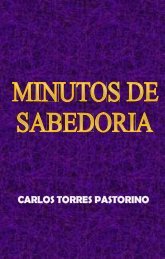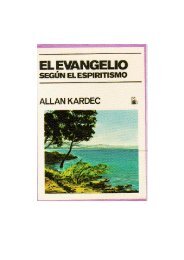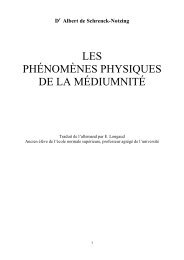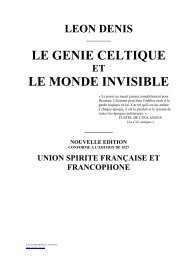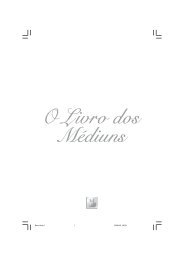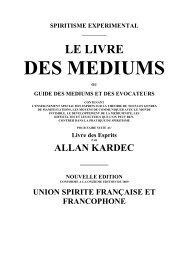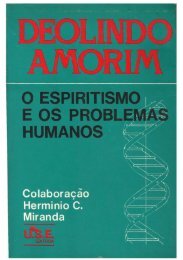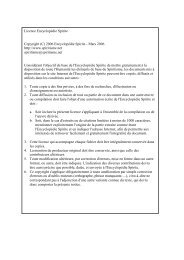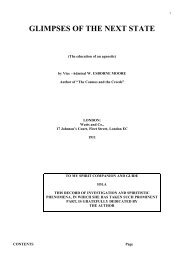'Twixt two worlds : a narrative of the life and work of William Eglinton
'Twixt two worlds : a narrative of the life and work of William Eglinton
'Twixt two worlds : a narrative of the life and work of William Eglinton
Create successful ePaper yourself
Turn your PDF publications into a flip-book with our unique Google optimized e-Paper software.
—<br />
Drawings <strong>and</strong> Writings Produced by Abnormal Means. 79<br />
a letter from Dr. Ferguson would hesitate to swear to his h<strong>and</strong>writing, <strong>and</strong>, in regard to <strong>the</strong><br />
whole matter, fraud was " impossible."<br />
In <strong>the</strong> garden room, used as a seance room, I was sitting one evening with Mr. <strong>Eglinton</strong><br />
<strong>and</strong> a young man who was encountering <strong>the</strong> usual difficulties <strong>of</strong> <strong>the</strong> beginning <strong>of</strong> a literary<br />
career. Egiinton took up a blank card from several lying on <strong>the</strong> table, showed us both sides<br />
<strong>of</strong> it, <strong>and</strong> <strong>the</strong>n threw it into a corner <strong>of</strong> <strong>the</strong> room, under some book shelves, where <strong>the</strong> light<br />
was obscure. With <strong>the</strong> card, or directly after it, he threw a stump <strong>of</strong> a lead pencil, <strong>and</strong><br />
instantly said to me,— "Doctor, please pick up <strong>the</strong> card!" I sprang <strong>and</strong> got it. It might<br />
have lain <strong>two</strong> or three seconds. On one side <strong>of</strong> <strong>the</strong> card we found <strong>the</strong> following :<br />
" Mons. Hargravc :<br />
"La bonne fortune el la inauvaise, sont necessaire a Vhomme, pour le rcndrc habile;<br />
ct aitssi la patience est amor, mats son fruit est doux."<br />
My readers will pardon me for giving a translation for <strong>the</strong> benefit <strong>of</strong> some who may<br />
possibly have forgotten <strong>the</strong>ir French. It is,— " Good <strong>and</strong> bad fortune are necessary to man<br />
to develop his talents (to make him clever) ; moreover, patience is bitter, but its fruit is<br />
sweet,"— probably a quotation from "Ernest's" favourite author, La Rochefoucauld.<br />
On a blank portion <strong>of</strong> this side was also written <strong>the</strong> word " renverser." Turning over<br />
<strong>the</strong> card, we found ten words in a language none <strong>of</strong> us knew, even by sight, though I<br />
recognised a likeness to some <strong>of</strong> <strong>the</strong> Sclavonic tongues, <strong>and</strong> thought it might be Czech or<br />
Hungarian. A German gentleman, who visited me lately, told me it was Hungarian, but he<br />
could not translate it.<br />
Of course I have no idea why a spirit should occupy <strong>two</strong> or three seconds in writing a<br />
few lines <strong>of</strong> French <strong>and</strong> Hungarian on a card thrown into a corner <strong>of</strong> <strong>the</strong> room, except to<br />
give us a demonstration <strong>of</strong> spirit-power. No doubt, receiving a message in an unknown<br />
tongue, may make it more impressive. I remember an instance. The Countess Wachtmeister was<br />
with us one evening <strong>and</strong> wished to get a message. She was quite familiar with three languages<br />
—Swedish, French, <strong>and</strong> English, <strong>and</strong> naturally expected one <strong>of</strong> <strong>the</strong>se. A blank card, which she<br />
carefully examined, was laid in <strong>the</strong> centre <strong>of</strong> a thick book taken from <strong>the</strong> shelf for <strong>the</strong><br />
purpose, on which she laid her h<strong>and</strong>s. In a few moments' she took out <strong>the</strong> card, <strong>and</strong> found<br />
it written all over in German, which nei<strong>the</strong>r she nor any one present could read. So she<br />
was obliged to take it next day to a German friend, or one who understood German, <strong>and</strong> get<br />
it translated. Of course it was all <strong>the</strong> better as a test, which was, perhaps, what she most<br />
needed.<br />
When a spirit materialises so that we can see him, <strong>the</strong>re must be matter solid enough to<br />
reflect <strong>the</strong> light. When spirits can grasp you by <strong>the</strong> h<strong>and</strong>, <strong>and</strong> hold up a chair or table,<br />
exercising, as I have seen <strong>the</strong>m, more force than is possessed by ordinary men, <strong>the</strong>y give<br />
pro<strong>of</strong> that <strong>the</strong>ir bones, muscles <strong>and</strong> tendons, are as solid as our own. I have calculated that<br />
one spirit, whom I have many times seen <strong>and</strong> felt, has exercised a muscular power three or<br />
four times greater than my own.<br />
A spirit-h<strong>and</strong> that you can see, <strong>and</strong> feel, <strong>and</strong> grasp, can <strong>of</strong> course be moulded like any<br />
o<strong>the</strong>r object. The Hon. J. L. O'Sullivan, a well-known American publicist <strong>and</strong> diplomatist, whom<br />
I have known for some thirty years, has given in English <strong>and</strong> American Spiritualist journals an




